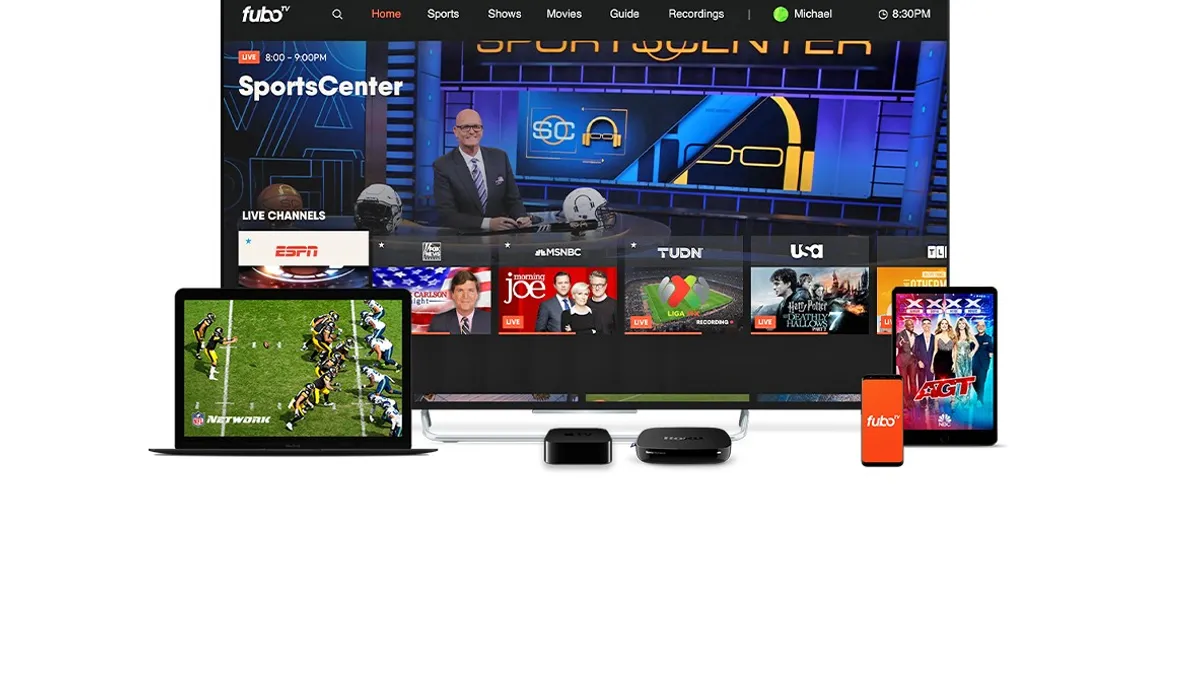Connected TV (CTV) continues to gain strength as an advertising channel, with ad spend forecast to reach $14.44 billion this year, up nearly 60% from 2020, per eMarketer. This surge comes as CTV seems poised to help advertisers address some of their marketing challenges while still enabling them to get in front of consumer eyeballs, with penetration plateauing at around 85% of U.S. households.
Despite issues with fragmentation and measurement, CTV platforms are ramping up their ad offerings, especially around identity as advertisers grapple with changes to internet identifiers and prepare for the death of third-party cookies. One such platform is FuboTV, a sports-focused virtual multichannel video programming distributor (vMVPD) that markets itself as a cable TV replacement for cord cutters.
"One in five TV dollars are now going to CTV, and I just think we should expect that trend to continue," said Diana Horowitz, FuboTV's senior vice president of advertising sales, citing a GroupM study. "At this point… you will literally not achieve your goals [without CTV]."
FuboTV has seen growth as consumers and advertisers flock to CTV, with subscribers up 108% and revenue up 156% year-over-year in the last quarter. Still, in such a highly competitive space, there are questions about the platform's long-term profitability as it burns through capital, with its stock losing about half of its value since its last earnings report.
The platform is working to differentiate itself from other vMVPDs operated by major players including YouTube and Hulu, while the growth of the vMVPD market has slowed and consumers experiment with a mix of over-the-top (OTT) solutions, whether subscription video on demand (SVOD) or ad-supposed video on demand (AVOD). To make its platform more attractive, it has made deals that make its offering more attractive to both consumers and advertisers.
Identity solutions
CTV and over-the-top (OTT) providers are well-suited to help advertisers target and track consumers in a post-cookie world, as cookies are not particularly relevant to how they serve content and ads. Nearly all (94%) of FuboTV's viewership is on a CTV device versus a laptop or mobile device, which is why the platform has taken a forward-looking approach when it comes to identity.
"Anything we can do to improve targeting, improve the ability for advertisers to reach their audiences and improve privacy [is a priority]," Horowitz said.
FuboTV was the first CTV platform to support Unified ID 2.0, the open-source identity solution created by The Trade Desk that has emerged as a leading replacement for third-party cookies and other identifiers. UID 2.0 has shored up support with agencies, ad-tech providers and publishers, and is starting to make its case to marketers, and could help FuboTV enhance its targeting capabilities and deliver more relevant advertising.
Along with its support of UID 2.0, FuboTV in November announced that it was fully integrated with Dentsu's people-based, identity and data platform M1, which was created by its Merkle subsidiary. The integration will help FuboTV match its first-party subscriber data with an advertiser's CRM data as it works with Live Ramp to create first-party segments.
"It really creates efficiencies for the Dentsu client base," Horowitz explained. "They know that they're reaching the right target audiences with FuboTV, and it gives them much more opportunities to really marry that data."
AI acquisition
FuboTV can further build on this data offering with contextual targeting that allows advertisers to reach consumers bases by putting their ads in a relevant environment. The platform believes that recent acquisition of AI-powered computer vision company Edisn.ai will eventually help beef up its contextual targeting capabilities.
The promise of Edisn.ai is that it can detect different content types in programming to create more enriched metadata, whether through visual recognition or closed caption data, that is deeper than what currently exists through partners like Nielsen, Horowitz said. It could also help FuboTV launch new ad units that are well-suited for its programming, like a picture-in-picture ad unit that would help advertisers reach viewers of soccer, which doesn't have the natural ad breaks of sports like football and baseball.
Beyond just ad units, FuboTV is working on a range of interactive elements that CTV makes possible. The platform this year added free-to-play games and live stats through its FanView offering, which could be extended to potentially tie e-commerce to CTV. AI can help solve a fundamental problem of advertising — targeting the right viewer in the right contextual environment with the right mindset — and serving e-commerce opportunities.
With its partnerships around identity solutions and an acquisition that could help improve contextual targeting and interactivity, FuboTV is looking to offer a one-stop shop for advertisers. The company launched a branded content studio during the NewFronts, giving advertisers the ability to create custom sponsorship and content opportunities, in addition to the data-driven opportunities it already has.
"For advertisers, [FuboTV] is the best of that television viewing experience, which we know is the optimal viewing experience for consumers, with true addressability of the inventory, which is the gold standard," Horowitz said.























